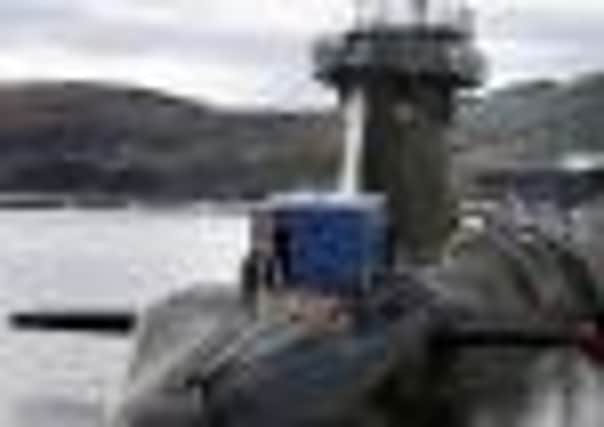Independent Scotland faces nuclear arms ban


Coalition Government offi-cials have acknowledged that, under international law, Scotland “would not be recognised as a state entitled to possess a nuclear deterrent”.
The statement, in a government analysis report on the effects of independence, appears to rule out the possibility of the UK doing a deal with an independent Scotland to keep nuclear weapons on the Clyde indefinitely under a new military pact.
Advertisement
Hide AdAdvertisement
Hide AdIt increases the prospect of Scottish and UK governments having to negotiate a formal leasing deal to allow nuclear weapons to continue to be stationed in Scotland, even temporarily, following a Yes vote in next year’s referendum.
The SNP said last night that once an independent government had signed up to non-proliferation treaty rules, Britain’s current submarine-based nuclear deterrent based at Faslane and Coulport would have to leave Scotland as soon as possible.
The Non Proliferation Treaty is a 40-year-old international agreement which has been signed by 190 countries – including the UK – and is designed to prevent the spread of nuclear weapons.
Article 1 states that countries such as Britain, which have nuclear weapons, must not give control over such armaments to non-nuclear states.
The UK Government’s legal position on Faslane has now been clarified in its analysis paper on Scottish independence. It states: “The future of the UK’s nuclear weapons and facilities would be an important issue to be resolved. Under international law, an independent Scotland would not be recognised as a state entitled to possess a nuclear deterrent.”
It states that “each nuclear-weapon state party to the treaty undertakes not to transfer to any recipient whatsoever nuclear weapons or other nuclear explosive devices or control over such weapons or explosive devices directly, or indirectly.”
The statement would appear to suggest that the weapons would have to be removed as soon as Scotland signed up to the NPT. The SNP has said that, after independence, it would demand the removal of the nuclear weapons in Faslane “as quickly as possible”.
However, immediate removal would mean leaving the rest of the UK without use of its nuclear submarines for up to 20 years while a new base is found.
Advertisement
Hide AdAdvertisement
Hide AdThe UK Government said in December that moving the weapons elsewhere would be an “enormous exercise” costing billions of pounds”.
Experts last night said that, as a result, the two sides could end up with an agreement to ensure British control over the nuclear base to comply with the NPT, so allowing the rest of the UK to continue to be armed.
Prof William Walker, an international relations expert at St Andrews University, said: “Under Article 1 of the treaty a nuclear weapons state can site its nuclear weapons in a non-nuclear weapons state but it is conditional on the grounds that they are under full control of the nuclear weapons state.
“So the UK could site them at Faslane but it would have to retain operational control of them.”
He added: “The territory would remain under Scottish sovereignty but could be leased to the UK, giving the UK rights to have its own police there and its own security.”
Professor Malcolm Chalmers, the leading security expert at the Royal United Services Institute, added: “I certainly think the NPT means that Scotland could have no control over UK nuclear weapons on its territory. I don’t think it means there could be no Scottish presence at Faslane, as long as the nuclear element of the base is cordoned off.”
Chalmers said there would also have to be an agreement under which Scotland allowed the British military unhindered access to the shipping lanes around the base.
He added: “The rest of the UK would want to be sure it was able to track potential threats and respond in a timely fashion.”
Advertisement
Hide AdAdvertisement
Hide AdHe said this would require a “significant deployment of UK conventional force” around the submarines. He added: “Scottish navy ships could certainly deploy in the Firth of Clyde, but there would have to be some mutually agreed limits and procedures.”
Such an arrangement would inevitably bring into question the SNP’s military plans post-independence, which involve using Faslane as the country’s navy port.
However, the party insists the weapons must be removed. SNP MP Angus Robertson said last night: “First the UK Government’s own legal adviser agreed that the Scottish Government’s time- scale for independence was ‘realistic’, and now the paper published by the Coalition says that nuclear weapons won’t be allowed in an independent Scotland – which will be music to the ears of the Scottish people. The SNP already propose to make weapons of mass destruction illegal in the constitution of an independent Scotland.”